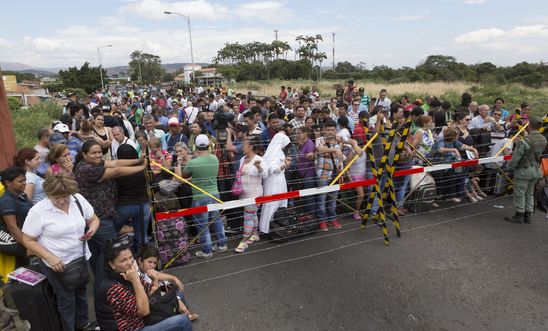
Press releases
Peru: Unlawfully turning away Venezuelans seeking protection - new report

Peru denying entry to vulnerable Venezuelans, including older people and unaccompanied children
Almost 4.8 million people have fled Venezuela in recent years
Peru has the world’s largest population of Venezuelan people seeking asylum
Peru is deliberately rejecting Venezuelan people seeking asylum at its border with Ecuador, despite the people appearing to fulfil all the criteria for international protection, Amnesty International said today [4 February] as it released a new report into the Venezuelan refugee crisis.
The 31-page report - In search of safety: Peru turns its back on people fleeing Venezuela – based on dozens of interviews in Peru and at the Peru-Ecuador border, shows how Peru is denying entry even to Venezuelans in vulnerable situations, including older people and unaccompanied children. Despite fleeing persecution and massive violations of human rights - international protection criteria recognised in Peruvian law - most of the Venezuelans that Amnesty interviewed had had their claims rejected or had been denied entry despite having a humanitarian visa.
Venezuelan’s stranded at the border
Since last June, Peru has introduced a series of measures with the deliberate aim of restricting entry to the country. A new “humanitarian visa” was effectively rendered obsolete only weeks after its introduction, because without entry and departure stamps from Ecuador, Venezuelans are not permitted to enter Peru, regardless of whether they have acquired the visa.
Amnesty spoke to many Venezuelans who were stranded at the border after having their asylum claims or humanitarian visas rejected. One man said he left Venezuela in October because he could no longer afford to feed his family. Despite having a valid Peruvian humanitarian visa in his passport, the Peruvian officials barred him from entering. Left in limbo at the border, he began to cry when he described how he had accumulated debt and left his family behind on the understanding that they would later be reunited in Peru.
Erika Guevara-Rosas, Americas Director at Amnesty International, said:
“As long as the serious deterioration in living conditions and the systematic violation of human rights in Venezuela continue, states should protect those fleeing the crisis in a search of a safe place where they can rebuild their lives.
“Peru seems to be repudiating its previously humane approach to Venezuelan people seeking protection. Changes to asylum practices and procedures at the Ecuador border appear to amount to a deliberate and unlawful policy of rejecting new arrivals from Venezuela.”
Unprecedent crisis in Venezuela
Years into an unprecedented crisis in Venezuela, millions are struggling to survive, unable to meet even their minimum needs for food, water and healthcare.
Almost 4.8 million people have fled the country in recent years. Peru has the world’s largest population of Venezuelan asylum-seekers, at 377,047, and is home to over 800,000 Venezuelans in total. The majority of Venezuelans fleeing the country are refugees and entitled to international protection, either under the international Refugee Convention or regional Cartagena Declaration.
Marina Navarro, Executive Director of Amnesty International Peru, said:
“In recent years, Peru has been an example of solidarity and safe refuge. Instead of resorting to restrictive policies, it should continue to demonstrate leadership and welcome Venezuelans, in line with its domestic and international obligations to guarantee the protection of people fleeing hunger and violence in Venezuela.”
Amnesty is calling on the Peruvian government to continue to uphold the right to seek asylum in compliance with its domestic, regional and international human rights obligations. At the same time, other countries, including those beyond the region, must share responsibility for Venezuelan refugees by increasing their financial and technical assistance to Peru and other host countries.